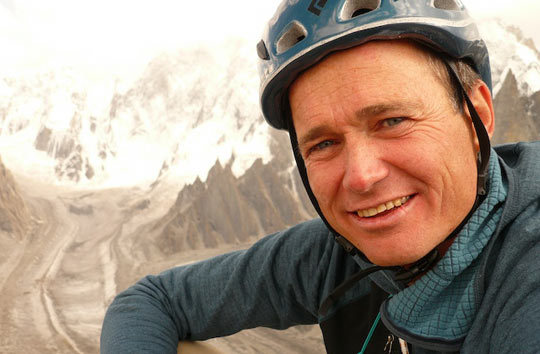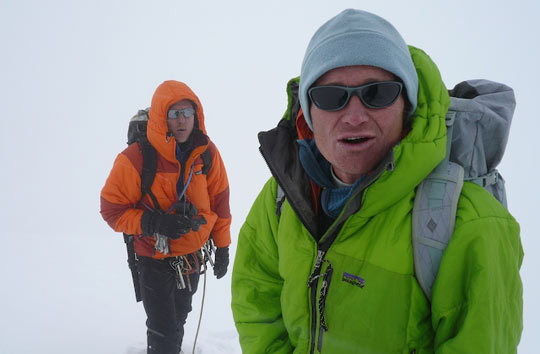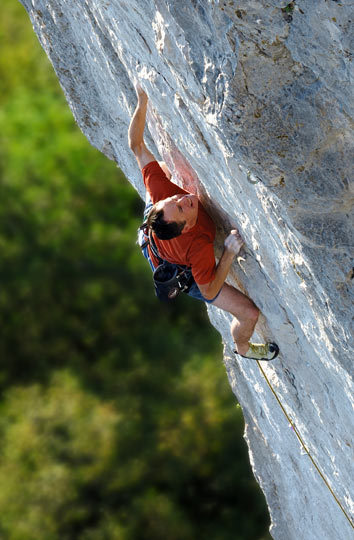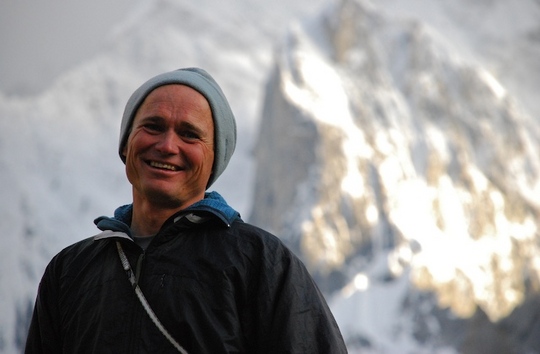
Prezelj on the summit of Nasser. [Photo] Steve House
Many climbers have a favorite mountaineering book or essay. Athletes and guides, those whose lives are so deeply connected to climbing, often have literary obsessions–and everything from a story’s lyricism to its ethical stance has influenced how they approach the sharp end.
We at Alpinist picked a handful of climbers we found inspirational and asked them to share their literary influences. Also check out Vince Anderson’s take on The Satanic Bible in the January 2, 2008 Weekly Feature; Kelly Cordes and Masatoshi Kuriaki’s vision of High Alaska in the January 30, 2008 Weekly Feature; Simon Richardson’s chapter on Gervasutti’s Climbs in the February 6, 2008 Weekly Feature, Royal Robbins’s infatuation with High Conquest in the April 2, 2008 Weekly Feature and Damien Gildea’s multiple inspirations in the April 16, 2008 Weekly Feature.

Marko Prezelj on The Way, by Nejc Zaplotnik
The book Pot (The Way) by Slovenian alpinist Nejc Zaplotnik was very influential when I began alpine climbing. At that time I was young and interested in everything connected with mountains. Pot was almost like a bible for us young alpinists because Nejc was a good climber, skilled in writing and a sort of rebel. We liked his way of thinking and his way of climbing. Everyone read it.
Pot is an autobiographical book about Nejc’s climbing life. He climbed several new routes in the mountains of Slovenia; he was active in the Alps, Yosemite and the Himalaya, where he climbed new routes on Hidden Peak, Makalu and Everest; he was on the team that climbed the south face of Lhotse. However, he was well regarded for many reasons beyond climbing, including his writing skills and his character.
I can’t say the book remains influential for me, since I did lots of climbing and lost a bit of the romantic virginity that is necessary to make any book influential. As long as we are new to any activity, our view is different than after several years of doing that same activity. Once I climbed in the Himalaya and learned that alpinists are not saints, the book become sort of like The Little Prince by Antoine de Saint Exupery–nice reading but in fact a fiction. Nejc was a pretender as well.
Now I read the book with more personal distance from the content, but I still like the language and the stories. Especially the ones in which he described his rebellion against people who he didn’t like. For example, he described a moment in the Montenvers train station when he asked some French tourist with a cigarette for a light. The tourist ignored him so Nejc took the cigarette from the tourist’s mouth, lit his own and stuck the cigarette back.

Marko Prezelj on the west summit of K7. [Photo] Steve House

[Photo] Marko Prezelj collection
The most commonly quoted part of the book is Nejc’s interpretation of an old wisdom–the way is the goal. “The one who is looking for a goal will remain empty, but those who find the way carry the goal in themselves forever.” This was the main, classic message of the book, and when I read the book, I was hooked. I understood the message as: be what you are, and try to have fun. This way of life or climbing is the goal and maybe not a particular summit. That was what I extracted from Pot.
It was a great message for a young person who just started with alpinism and saw older alpinists as far more experienced. Now I’m old(er), and I experienced and learned that the way of living and climbing is the only thing that makes sense. If I have a particular goal in which only the destination is important, my motivation is not as strong as when “the way” of doing it motivates me. Alpinism became my way of life well before I was aware of it.
The book was published in 1981, and Nejc Zaplotnik died in a serac avalanche under Manaslu, Himalaya in 1983. At the time he died, I was young, and I didn’t understand much about alpinism. I just liked it without thinking or asking questions. My “way” has changed over time, but Zaplotnik’s foundations remain and continue to inspire.
–Marko Prezelj, Slovenia

[Photo] Steve House